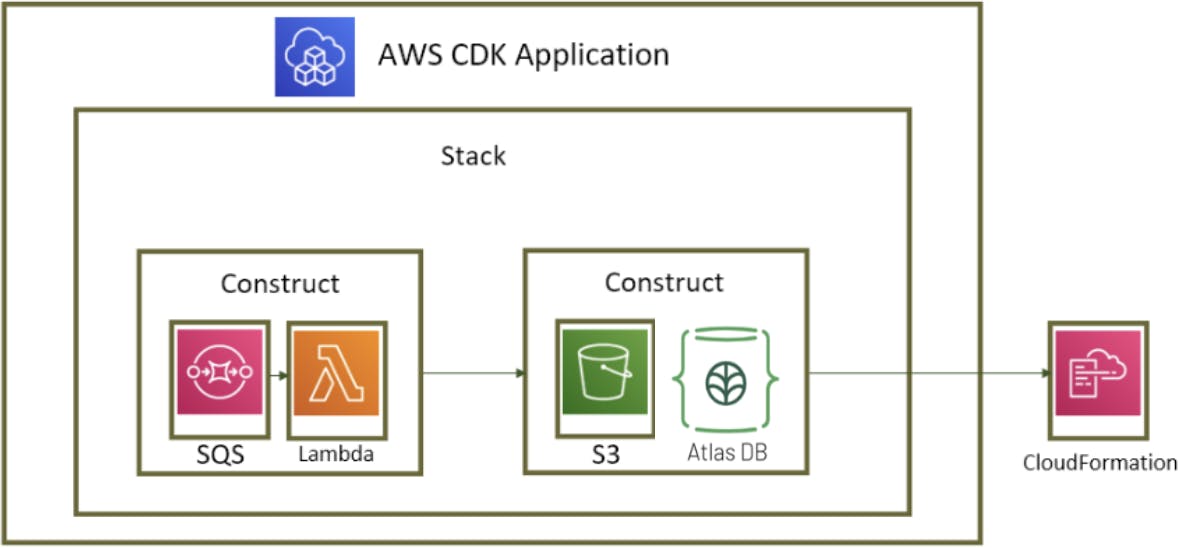Infrastructure as Code (IaC) tools allows developers to manage and provision infrastructure resources through code, rather than through manual configuration. IaC have empowered developers to apply similar best practices from software development to application instructure deployments. This includes:
Automation - helping to ensure repeatable, consistent, and reliable infrastructure deployments
Version Control - check in IaC code into GitHub, BitBucket, AWS CodeCommit, or GitLab for improved team collaboration and higher code quality
Security - create clear audit trails of each infrastructure modification
Disaster Recovery - IaC scripts can be used to quickly recreate infrastructure in the event of availability zone or region outages
Cost Savings - prevent overprovisioning and waste of cloud resources
Improved Compliance - easier to enforce organizational policies and standards
Today we are doubling down on this commitment and announcing MongoDB Atlas integrations with AWS CloudFormation and Cloud Development Kit (CDK). AWS CloudFormation allows customers to define and provision infrastructure resources using JSON or YAML templates. CloudFormation provides a simple way to manage infrastructure as code and automate the deployment of resources. AWS Cloud Development Kit (CDK) is an open-source software development framework that allows customers to define cloud infrastructure in code and provision it through AWS CloudFormation. It supports multiple programming languages and allows customers to use high-level abstractions to define infrastructure resources. These new integrations are built on top of the Atlas Admin API and allow users to automate infrastructure deployments by making it easy to provision, manage, and control Atlas Infrastructure as Code in the cloud.
MongoDB Atlas & AWS CloudFormation:
To meet developers where they are, we now have multiple ways to get started with MongoDB Atlas using AWS Infrastructure as Code. Each of these allow users to provision, manage, and control Atlas infrastructure as code on AWS:
Option 1: AWS CloudFormation
Customers can begin their journey using Atlas resources directly from the AWS CloudFormation Public Registry. We currently have 33 Atlas Resources and will continue adding more. Examples of available Atlas resources today include: Dedicated Clusters, Serverless Instances, AWS PrivateLink, Cloud Backups, and Encryption at Rest using Customer Key Management. In addition, we have published these resources to 22 (and counting) AWS Regions where MongoDB Atlas is supported today.
Learn how to get started via this quick demo.

Option 2: AWS CDK
After its launch in 2019 as an open source project, AWS CDK has gained immense popularity among the developer community with over a thousand external contributors and more than 1.3 million weekly downloads. AWS CDK abstracts away the low-level details of cloud infrastructure, making it easier for developers to define and manage their infrastructure natively in their programming language of choice. This helps to simplify the deployment process and eliminates context switching. Under the hood, AWS CDK synthesizes CloudFormation templates on your behalf which is then deployed to AWS accounts. In AWS CDK, L1 (Level 1) and L2 (Level 2) constructs refer to two different levels of abstraction for defining infrastructure resources: L1 constructs are lower-level abstractions that provide a one-to-one mapping to AWS CloudFormation resources. They are essentially AWS CloudFormation resources wrapped in code, making them easier to use in a programming context. L2 constructs are higher-level abstractions that provide a more user-friendly and intuitive way to define AWS infrastructure. They are built on top of L1 constructs and provide a simpler and more declarative API for defining resources.
Today we announce MongoDB Atlas availability for AWS CDK in JavaScript and TypeScript, with plans for Python, Java, Go, and .NET support coming later in 2023. Now customers can easily deploy and manage all available Atlas resources by vending AWS CDK applications with prebuilt L1 Constructs. We also have a growing number of L2 and L3 CDK Constructs available. These include Constructs to help users to quickly deploy the core resources they need to get started with MongoDB Atlas on AWS in just a few lines JavaScript or TypeScript (see awscdk-resources-mongodbatlas to learn more). Users can also optionally select to add more advanced networking configurations such as VPC peering and AWS PrivateLink.

Option 3:
Instead of manually pulling together multiple Atlas CloudFormation resources, AWS Partner Solutions gives customers access to pre-built CloudFormation templates for both general and specific use cases with MongoDB Atlas. By using AWS Partner Solution templates, customers can save time and effort compared to architecting their deployments from scratch. These were jointly created and incorporate best practices from MongoDB Atlas and AWS. Go to the AWS Partner Solutions Portal to get started.
Start building today!
These MongDB Atlas integrations with AWS CloudFormation are free and open source licensed under Apache License 2.0. Users only pay for underlying Atlas resources created and can get started with Atlas always free tier (M0 clusters).
Getting started today is faster than ever with MongoDB Atlas and AWS CloudFormation. We can’t wait to see what you will build next with this powerful combination!